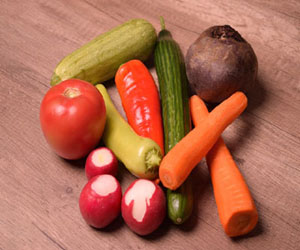


Maximizing Your Kitchen Productivity

In our fast-paced lives, finding time to cook nutritious meals can be a challenge. Cooking efficiency is the key to preparing delicious, home-cooked dishes without spending hours in the kitchen. Whether you're a busy professional, a parent on the go, or just looking to streamline your cooking process, the following tips will help you make the most of your time in the kitchen.
1. Plan Your Meals
Efficient cooking begins with meal planning. By deciding in advance what you'll be making for the week, you can create a shopping list that ensures you have all the necessary ingredients on hand. This eliminates last-minute grocery store runs and saves you time.
2. Prep Ingredients In Advance
Before you start cooking, take some time to prepare your ingredients. Chop vegetables, marinate meats, and measure out spices. Having everything ready to go will make the cooking process smoother and more efficient.
3. Multi-Task
Efficient cooking often involves multi-tasking. While one dish is simmering, you can be chopping ingredients for the next one. Just be sure to keep an eye on what's cooking to prevent burning or overcooking.
4. Use Kitchen Appliances
Kitchen appliances like food processors, blenders, and slow cookers can save you a lot of time and effort. Food processors can quickly chop, slice, and shred vegetables, while slow cookers allow you to prepare meals in the morning and return to a ready dinner in the evening.
5. Cook In Batches
Cooking efficiency is all about making the most of your time. When preparing meals, consider making extra portions. Leftovers can be used for future meals, eliminating the need to cook from scratch every day.
6. Embrace One-Pot And Sheet Pan Meals
One-pot and sheet pan meals are a time-saving marvel. They involve cooking an entire meal in a single pot or on a single sheet pan, minimizing cleanup and simplifying the cooking process.
7. Time-Saving Ingredients
Choose ingredients that are quick to cook or require minimal preparation. For example, opt for boneless, skinless chicken breasts over whole chickens, or use canned beans instead of dried ones that require soaking and long cooking times.
8. Learn Quick Cooking Techniques
Mastering fast cooking techniques like stir-frying, sautéing, and pan-searing can help you prepare meals in minutes. These methods are not only efficient but also help retain the flavor and nutrients in your food.
9. Organize Your Kitchen
An organized kitchen is a key to cooking efficiency. Keep your kitchen well-arranged, with pots and pans easily accessible, utensils at arm's reach, and spices organized for quick retrieval.
10. Clean As You Go
Efficient cooking also involves cleaning as you go. This means washing dishes, utensils, and countertops as you finish using them, rather than letting the mess pile up.
11. Utilize Leftovers Creatively
Don't let leftovers go to waste. Transform last night's roasted vegetables into a delicious frittata or add cooked chicken to a salad for a quick lunch.
Cooking efficiency is all about optimizing your time and resources in the kitchen. With careful planning, smart preparation, and the use of time-saving techniques and appliances, you can prepare nutritious and flavorful meals without spending excessive time in the kitchen. By making these strategies a part of your culinary routine, you'll not only save time but also enjoy the pleasures of home-cooked meals more frequently, making your daily life more efficient and enjoyable.
Nurturing The Body, Mind, And Spirit
 Holistic healing begins with the physical body, and essential plant extracts play a significant role in this aspect of well-being. Oils such as lavender, tea tree, and eucalyptus are well-known for their ability to address physical ailments. Lavender, with its soothing and calming properties, is often used to reduce stress and improve sleep quality. Eucalyptus and tea tree oil are celebrated for their effects on respiratory health and can alleviate symptoms of congestion and cough. These oils can be applied topically, inhaled, or incorporated into massages and baths to promote physical healing.
Holistic healing begins with the physical body, and essential plant extracts play a significant role in this aspect of well-being. Oils such as lavender, tea tree, and eucalyptus are well-known for their ability to address physical ailments. Lavender, with its soothing and calming properties, is often used to reduce stress and improve sleep quality. Eucalyptus and tea tree oil are celebrated for their effects on respiratory health and can alleviate symptoms of congestion and cough. These oils can be applied topically, inhaled, or incorporated into massages and baths to promote physical healing.
Emotional Balance
Emotional health is another essential component of holistic healing. Our emotional states are closely linked to our overall well-being, and essential oils can help restore emotional equilibrium. Aromas like citrus, rose, and chamomile are celebrated for their mood-enhancing and calming effects. Diffusing these oils or using them in relaxation rituals can significantly enhance emotional well-being and provide relief from the daily stresses of life.
Mental Clarity
Cognitive health is fundamental to our overall well-being, and essential plant extracts can help enhance mental clarity and reduce mental fatigue. Oils like peppermint and rosemary are known for their ability to improve cognitive function and concentration. Incorporating these oils into workspaces or using them during meditation practices can create an environment that supports mental well-being.
The Holistic Approach
Essential plant extracts offer a holistic approach to well-being, recognizing the interconnectedness of our physical, emotional, and mental states.








The Power Of Thankfulness

At the heart of gratitude is the acknowledgment of the good things we have, rather than dwelling on what we lack. This shift in focus can be a game-changer in the pursuit of happiness. Gratitude helps us see the glass as half full, fostering a more positive outlook on life. When we practice gratitude, we consciously reflect on the blessings, big or small, that surround us. This act of reflection can enhance our perception of life's abundance and the joy it brings.
Scientific studies have shed light on the connection between gratitude and happiness. Researchers have found that individuals who regularly practice gratitude tend to experience higher levels of life satisfaction and overall happiness. Gratitude activates the brain's reward system, releasing feel-good neurotransmitters like dopamine and serotonin, which contribute to feelings of joy and contentment.
Furthermore, gratitude can act as a buffer against stress and negative emotions. It helps us build resilience by promoting a positive perspective even in challenging situations. When we're confronted with difficulties, acknowledging the things we're grateful for can provide a sense of perspective and emotional stability, making it easier to navigate life's ups and downs.
One of the simplest ways to incorporate gratitude into your daily life is by keeping a gratitude journal. This involves taking a few minutes each day to write down things you are thankful for. Whether it's a loving family, good health, a delicious meal, or a beautiful sunset, the act of recording these positive aspects of life can be a source of happiness in itself.
Gratitude is not only about appreciating what we have; it's also about fostering positive relationships.
Paving The Path To Success And Fulfillment
 Understanding Realistic Goals
Understanding Realistic Goals
Realistic goals are those that are achievable within the constraints of your resources, time, and abilities. These goals are grounded in reality, and they are not overly ambitious or unattainable. They take into account your current circumstances and limitations while aiming for meaningful progress.
The Importance Of Realistic Goals
Motivation And Confidence: Setting realistic goals allows you to see consistent progress, which in turn boosts motivation and confidence. Achieving smaller, attainable milestones can be highly motivating and keep you on track.
Reduced Stress: Unrealistic goals can lead to stress and anxiety, as they often set you up for failure. Realistic goals, on the other hand, promote a healthier, more balanced approach to success.
Clarity And Focus: Realistic goals provide clarity and direction. They help you prioritize and focus on what is most important, reducing distractions and enhancing productivity.
Sustainability: Goals that are too ambitious may lead to burnout, while realistic goals are more sustainable. They allow you to pace yourself, maintain work-life balance, and avoid overexertion.
Creating Realistic Goals
Self-Reflection: Start by assessing your current situation, skills, and resources. Consider your strengths and weaknesses. This self-reflection provides a foundation for setting realistic goals.
Specificity: Be clear and specific about what you want to achieve. Vague goals make it challenging to measure progress and stay on course.
A Recipe For Success
 2. Create A Balanced Plate: When planning gluten-free meals, aim to create a balanced plate that includes protein, vegetables, and gluten-free grains. This combination ensures you get a variety of nutrients and keeps your meals satisfying and filling.
2. Create A Balanced Plate: When planning gluten-free meals, aim to create a balanced plate that includes protein, vegetables, and gluten-free grains. This combination ensures you get a variety of nutrients and keeps your meals satisfying and filling.
3. Stock Your Kitchen: Ensure your kitchen is well-stocked with gluten-free essentials. This includes gluten-free grains like rice, quinoa, and gluten-free pasta, as well as a variety of proteins, fresh fruits, vegetables, and gluten-free cooking staples like gluten-free flours.
4. Explore Gluten-Free Recipes: There is a plethora of gluten-free recipes available online and in cookbooks. These resources can provide inspiration and guidance for creating delicious gluten-free meals. Experiment with new recipes to keep your meals interesting and flavorful.
5. Plan Ahead: Effective meal planning involves thinking ahead. Set aside time each week to plan your meals, create a shopping list, and prepare some elements in advance, such as washing and chopping vegetables. This will make meal preparation more efficient during the week.
6. Read Labels Carefully: When purchasing packaged foods, always read labels diligently. Look for the "gluten-free" label or certifications to ensure the product is safe. Also, be aware of potential hidden sources of gluten in ingredient lists.
7. Be Mindful When Dining Out: Eating out can be a bit more challenging, but it's manageable with some careful planning. Research gluten-free-friendly restaurants in your area, and when dining out, communicate your dietary needs to the server. Many restaurants offer gluten-free menus or options.
A Path To Thriving
 The Role Of Positive Psychology In Resilience
The Role Of Positive Psychology In Resilience
Positive psychology examines the factors that contribute to human happiness, well-being, and optimal functioning. In the context of resilience, positive psychology emphasizes the cultivation of positive emotions, character strengths, and a positive mindset. Here's how positive psychology can aid in building resilience:
Fostering Positive Emotions: Positive psychology emphasizes the importance of cultivating positive emotions such as gratitude, hope, and joy. These emotions can serve as emotional resources during challenging times, promoting resilience.
Identifying Strengths: Positive psychology encourages individuals to recognize and leverage their character strengths. By utilizing these strengths, individuals can overcome adversity more effectively.
Developing A Growth Mindset: Positive psychology emphasizes the power of a growth mindset, which involves viewing challenges as opportunities for growth and learning. This mindset is closely tied to resilience.
Enhancing Psychological Well-Being: Positive psychology interventions, such as mindfulness and gratitude exercises, can improve psychological well-being, which is associated with increased resilience.
Practical Steps For Building Resilience Through Positive Psychology
Cultivate Gratitude: Regularly practice gratitude by acknowledging and appreciating the positive aspects of your life. Keeping a gratitude journal is an effective way to develop this skill.
Foster Optimism: Train your mind to focus on positive outcomes and expect the best, even in challenging situations. Challenge negative self-talk and pessimism with more optimistic thinking patterns.
Discover Your Strengths: Identify your unique character strengths through self-assessment tools or professional assessments. Once you recognize your strengths, find ways to incorporate them into your daily life and problem-solving.
A Journey To Joyful Living
 Shifting Perspective: Gratitude encourages a shift in perspective from a "glass-half-empty" outlook to a "glass-half-full" mindset. By consciously looking for and appreciating the positive aspects of life, we train our minds to focus on what's good, thereby increasing our overall happiness.
Shifting Perspective: Gratitude encourages a shift in perspective from a "glass-half-empty" outlook to a "glass-half-full" mindset. By consciously looking for and appreciating the positive aspects of life, we train our minds to focus on what's good, thereby increasing our overall happiness.
Reducing Stress And Anxiety: Gratitude has a profound impact on our stress levels and emotional well-being. When we practice gratitude, it activates the brain's reward system, releasing feel-good neurotransmitters like dopamine and serotonin. These chemicals counteract the effects of stress hormones, leading to reduced anxiety and increased relaxation.
Enhancing Emotional Well-Being: Regularly practicing gratitude is associated with higher levels of happiness, contentment, and life satisfaction. It promotes a more positive emotional atmosphere, allowing us to experience joy even in the midst of life's challenges.
Fostering Resilience: Gratitude is a powerful tool for building emotional resilience. When we can find reasons to be thankful, even in difficult situations, we develop the ability to bounce back from adversity and maintain a positive outlook on life.
Strengthening Relationships: Expressing gratitude in our interactions with others fosters deeper connections. It not only makes people feel appreciated but also creates a supportive and empathetic environment that is vital for maintaining and nurturing relationships.
Promoting Mindfulness: Finding happiness through gratitude encourages mindfulness. It prompts us to be present in the moment, to savor the beauty in our surroundings, and to cultivate an attitude of appreciation.
To incorporate gratitude into your daily life and find happiness, you can start by keeping a gratitude journal. Each day, take a few minutes to write down things you are thankful for. They can range from significant life events to the simple pleasures of daily existence. The key is to make this practice a part of your daily routine, and as you do, you'll start to notice the transformative power of gratitude.